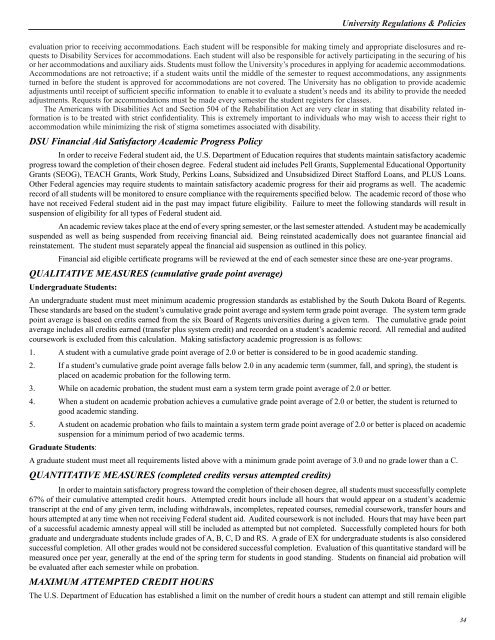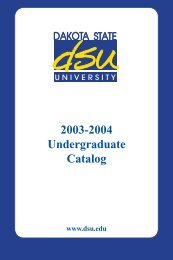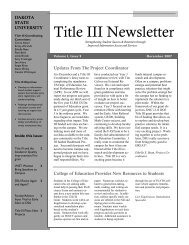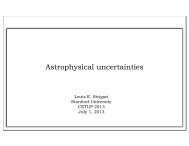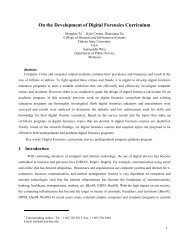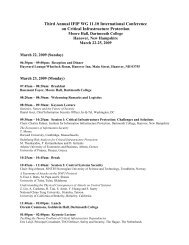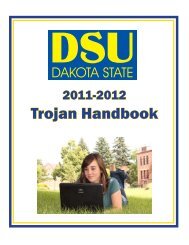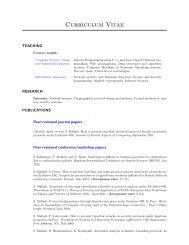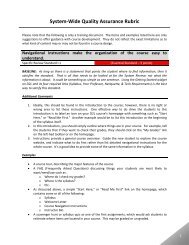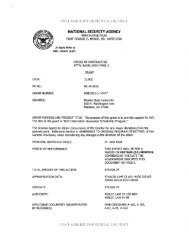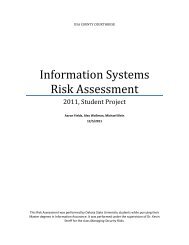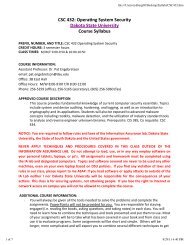Academic Calendar – Fall 2012 - Dakota State University
Academic Calendar – Fall 2012 - Dakota State University
Academic Calendar – Fall 2012 - Dakota State University
Create successful ePaper yourself
Turn your PDF publications into a flip-book with our unique Google optimized e-Paper software.
<strong>University</strong> Regulations & Policies<br />
evaluation prior to receiving accommodations. Each student will be responsible for making timely and appropriate disclosures and requests<br />
to Disability Services for accommodations. Each student will also be responsible for actively participating in the securing of his<br />
or her accommodations and auxiliary aids. Students must follow the <strong>University</strong>’s procedures in applying for academic accommodations.<br />
Accommodations are not retroactive; if a student waits until the middle of the semester to request accommodations, any assignments<br />
turned in before the student is approved for accommodations are not covered. The <strong>University</strong> has no obligation to provide academic<br />
adjustments until receipt of sufficient specific information to enable it to evaluate a student’s needs and its ability to provide the needed<br />
adjustments. Requests for accommodations must be made every semester the student registers for classes.<br />
The Americans with Disabilities Act and Section 504 of the Rehabilitation Act are very clear in stating that disability related information<br />
is to be treated with strict confidentiality. This is extremely important to individuals who may wish to access their right to<br />
accommodation while minimizing the risk of stigma sometimes associated with disability.<br />
DSU Financial Aid Satisfactory <strong>Academic</strong> Progress Policy<br />
In order to receive Federal student aid, the U.S. Department of Education requires that students maintain satisfactory academic<br />
progress toward the completion of their chosen degree. Federal student aid includes Pell Grants, Supplemental Educational Opportunity<br />
Grants (SEOG), TEACH Grants, Work Study, Perkins Loans, Subsidized and Unsubsidized Direct Stafford Loans, and PLUS Loans.<br />
Other Federal agencies may require students to maintain satisfactory academic progress for their aid programs as well. The academic<br />
record of all students will be monitored to ensure compliance with the requirements specified below. The academic record of those who<br />
have not received Federal student aid in the past may impact future eligibility. Failure to meet the following standards will result in<br />
suspension of eligibility for all types of Federal student aid.<br />
An academic review takes place at the end of every spring semester, or the last semester attended. A student may be academically<br />
suspended as well as being suspended from receiving financial aid. Being reinstated academically does not guarantee financial aid<br />
reinstatement. The student must separately appeal the financial aid suspension as outlined in this policy.<br />
Financial aid eligible certificate programs will be reviewed at the end of each semester since these are one-year programs.<br />
QUALITATIVE MEASURES (cumulative grade point average)<br />
Undergraduate Students:<br />
An undergraduate student must meet minimum academic progression standards as established by the South <strong>Dakota</strong> Board of Regents.<br />
These standards are based on the student’s cumulative grade point average and system term grade point average. The system term grade<br />
point average is based on credits earned from the six Board of Regents universities during a given term. The cumulative grade point<br />
average includes all credits earned (transfer plus system credit) and recorded on a student’s academic record. All remedial and audited<br />
coursework is excluded from this calculation. Making satisfactory academic progression is as follows:<br />
1. A student with a cumulative grade point average of 2.0 or better is considered to be in good academic standing.<br />
2. If a student’s cumulative grade point average falls below 2.0 in any academic term (summer, fall, and spring), the student is<br />
placed on academic probation for the following term.<br />
3. While on academic probation, the student must earn a system term grade point average of 2.0 or better.<br />
4. When a student on academic probation achieves a cumulative grade point average of 2.0 or better, the student is returned to<br />
good academic standing.<br />
5. A student on academic probation who fails to maintain a system term grade point average of 2.0 or better is placed on academic<br />
suspension for a minimum period of two academic terms.<br />
Graduate Students:<br />
A graduate student must meet all requirements listed above with a minimum grade point average of 3.0 and no grade lower than a C.<br />
QUANTITATIVE MEASURES (completed credits versus attempted credits)<br />
In order to maintain satisfactory progress toward the completion of their chosen degree, all students must successfully complete<br />
67% of their cumulative attempted credit hours. Attempted credit hours include all hours that would appear on a student’s academic<br />
transcript at the end of any given term, including withdrawals, incompletes, repeated courses, remedial coursework, transfer hours and<br />
hours attempted at any time when not receiving Federal student aid. Audited coursework is not included. Hours that may have been part<br />
of a successful academic amnesty appeal will still be included as attempted but not completed. Successfully completed hours for both<br />
graduate and undergraduate students include grades of A, B, C, D and RS. A grade of EX for undergraduate students is also considered<br />
successful completion. All other grades would not be considered successful completion. Evaluation of this quantitative standard will be<br />
measured once per year, generally at the end of the spring term for students in good standing. Students on financial aid probation will<br />
be evaluated after each semester while on probation.<br />
MAXIMUM ATTEMPTED CREDIT HOURS<br />
The U.S. Department of Education has established a limit on the number of credit hours a student can attempt and still remain eligible<br />
34


